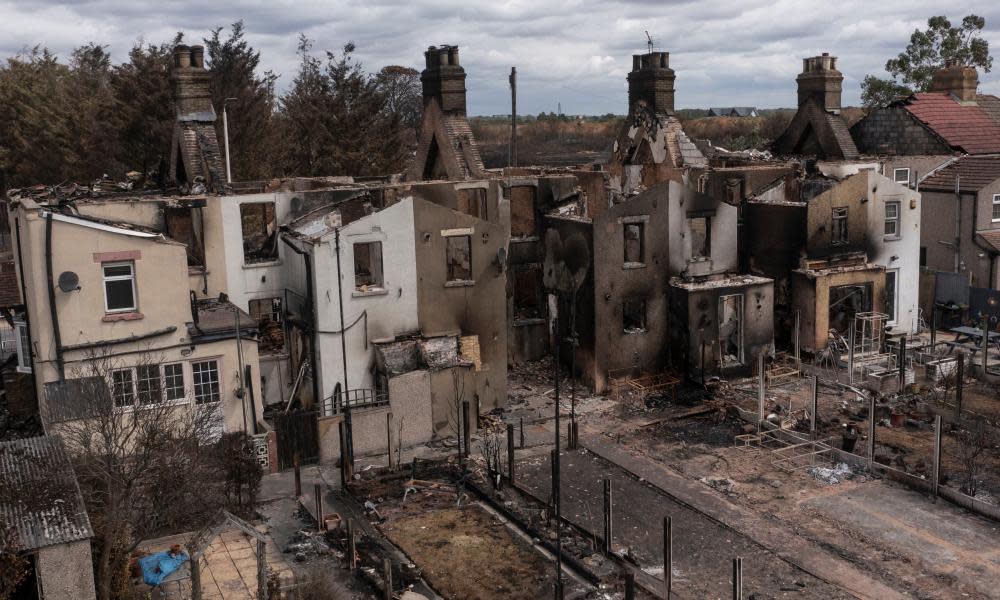UK ‘strikingly unprepared’ for impacts of climate crisis

The UK is “strikingly unprepared” for the impacts of the climate crisis, according to the Climate Change Committee (CCC), which said there had been a “lost decade” in efforts to adapt for the impacts of global heating.
The CCC, the government’s official climate adviser, said climate damages will inevitably intensify for decades to come. It has warned repeatedly of poor preparation in the past and said government action was now urgently needed to protect people and their homes and livelihoods.
The extreme heatwave in 2022, when temperatures surpassed 40C for the first time, was both an example and a warning, the CCC said. More than 3,000 people died early and 20% of hospital operations were cancelled at the peak of the heatwave, while rail lines buckled, wildfires raged and farmers struggled with drought. “It won’t be long before those kinds of very hot summers are a normal summer,” said Chris Stark, CCC chief executive.
Areas where needed action is missing include heat-proofing homes, stemming leaks from water supply pipes and preparing for flash floods and shortages of food and other imports from nations struck by climate impacts.
“The government is not putting together a plan that reflects the scale and the nature of the risks that face the whole country,” said Stark. “This is completely critical. There is no option but to adapt to the change in the climate. The question is only whether we do that well by doing it early or wait until later.”
Acting early would be cheaper and better, he said, than acting in a “panicked way” later.
Julia King, chair of the CCC’s Adaptation Committee, said: “The last decade has been a lost decade in terms of preparing for the risks we already have and those that we know are coming.”
A recent IPCC report showed that climate damages are hitting harder and faster than expected, she said, and that the global temperature will not stop rising until carbon emissions reach net zero, a target set for 2050 by many countries.
“It means we’ve got at least 30 more years of escalating hazards,” she said. “Every month that passes locks in more damaging impacts. Action is needed, and we need it now.”
Related: Revealed: how climate breakdown is supercharging toll of extreme weather
The UN secretary general, António Guterres, said on Tuesday: “Climate chaos is wreaking havoc on economies, businesses, supply chains and public finances, and we are on a trajectory for far worse.”
The CCC report said “fully credible” UK government planning for climate change, where nearly all the necessary policy milestones were in place, was found for only five of the 45 adaptation requirements examined. Plans to cope with river and coastal flooding was one positive example. However, the report found there was not sufficient implementation of adaptation plans in any of the 45 areas.
A UK government spokesperson said: “We welcome the CCC’s recognition of our progress so far and will factor its recommendations into our updated National Adaptation Programme, which will be published later this year and will ensure we robustly address the full range of climate risks to the UK.”
The last National Adaptation Programme was published in 2018 and the CCC said: “It lacks a clear vision. It is not underpinned by tangible outcomes or targets. It has not driven policy and implementation across government.”
Related: Little progress made on energy efficiency in UK homes, report finds
The CCC assessment highlighted the lack of reporting by major food companies on climate risks to their supply chains. The UK imports about half its food, and recent shortages of imported vegetables have shown its vulnerability to weather-related impacts, the CCC said. Among its recommendations were for farmers to consider new crops, such as peaches and apricots in Kent.
The committee said homes are still being built in areas at future risk of flooding, while on the coast plans are inadequate to deal with people losing their homes to rising seas. The CCC also said that, while standards for new homes included protection against heatwaves, there was a lack of policy to tackle overheating in existing homes.
The new National Adaptation Programme will be a “make-or-break moment”, the committee said, and would have to increase public funding for adaptation as well as remove barriers to private investment.
“The National Adaptation Programme we have at the moment is just nowhere near the kind of cross-government, powerful framework that would be equivalent to the climate risks that we face,” said Stark. “In fact, it’s a document that sits in a relatively dusty cupboard somewhere in [Whitehall].”

 Yahoo News
Yahoo News 
